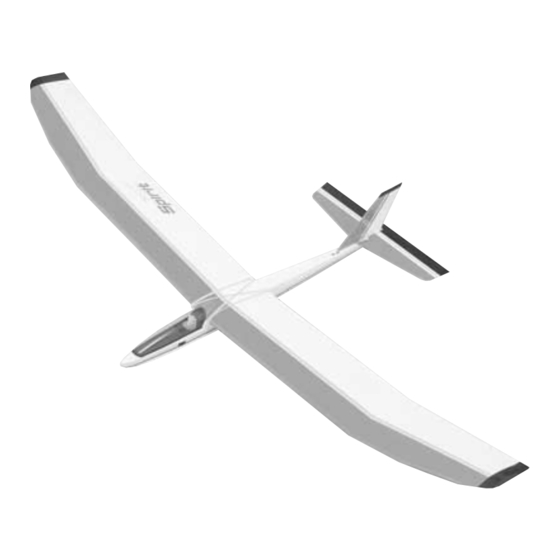GREAT PLANES Spirit Manuel d'instruction - Page 13
Parcourez en ligne ou téléchargez le pdf Manuel d'instruction pour {nom_de_la_catégorie} GREAT PLANES Spirit. GREAT PLANES Spirit 16 pages. 2-meter sailpane

PREFLIGHT
Charge the Batteries
Follow the battery charging procedures in your radio
instruction manual. You should charge your transmitter and
receiver batteries the night before you go flying, and at other
times as recommended by the radio manufacturer.
Find a Safe Place to Fly
The best place to fly your R/C model is an AMA (Academy
of Model Aeronautics) chartered club field. Ask your hobby
shop dealer if there is such a club in your area and join. Club
fields are set up for R/C flying which makes your outing
safer and more enjoyable. The AMA can also tell you the
name of a club in your area. We recommend that you join
AMA and a local club so you can have a safe place to fly and
also have insurance to cover you in case of a flying
accident. (The AMA address is listed on page 2 of this
instruction book).
If a club and its flying site are not available, you need to find
a large, grassy area at least 6 miles away from any other
R/C radio operation and away from houses, buildings and
streets. A schoolyard may look inviting but it is usually too
close to people, power lines and possible radio interference.
If you are not thoroughly familiar with the operation of R/C
models, ask an experienced modeler to check to see that
you have the radio installed correctly and that all the control
surfaces do what they are supposed to.
Range Check Your Radio
Wherever you do fly, you need to check the operation of the
radio before every time you fly. This means with the
transmitter antenna collapsed and the receiver and
transmitter on, you should be able to walk at least 100 feet
away from the model and still have control. Have someone
help you. Have them stand by your model and, while you
work the controls, tell you what the various control surfaces
are doing.
AMA SAFETY CODE (excerpt)
Read and abide by the following Academy of Model
Aeronautics Official Safety Code excerpt:
General
1. I will not fly my model aircraft in competition or in the
presence of spectators until it has been proven to be airworthy
by having been previously successfully flight tested.
2. I will not fly my model aircraft higher than approximately
400 feet within 3 miles of an airport without notifying the
airport operator. I will give right of way to, and avoid flying in
the proximity of full-scale aircraft. Where necessary an
observer shall be utilized to supervise flying to avoid having
models fly in the proximity of full-scale aircraft.
3. Where established, I will abide by the safety rules for the
flying site I use, and I will not willfully and deliberately fly my
models in a careless, reckless and/or dangerous manner.
Radio Control
1. I will have completed a successful radio equipment ground
check before the first flight of a new or repaired model.
2. I will not fly my model aircraft in the presence of spectators
until I become a qualified flyer, unless assisted by an
experienced helper.
3. I will perform my initial turn after takeoff away from the pit,
spectator and parking areas, and I will not thereafter perform
maneuvers, flights of any sort or landing approaches over a
pit, spectator or parking area.
First of all, if you are flying with other flyers check to
make sure they are not flying or testing on the same
frequency as your model.
Try to find an experienced pilot to help you with your
first flights. Although the SPIRIT is very easy to fly, an
experienced pilot can save you a lot of time and possible
aggravation by helping you get your model in the air
smoothly.
It is a good idea to do a couple of trim flights before each
flying session to make sure the plane is still in trim and the
radio is working properly. The model will survive a hard
landing from 5 feet much better than it will one from several
hundred feet. The first few trim flights should be done over
a grass field. The longer the grass the better (more cushion).
Turn on the transmitter first and then the receiver. Hold the
SPIRIT ARF under the wing with the nose pointed slightly
13
